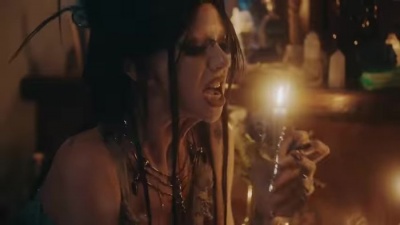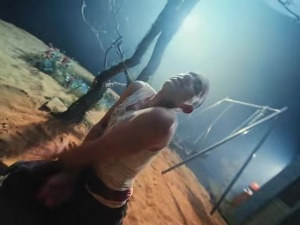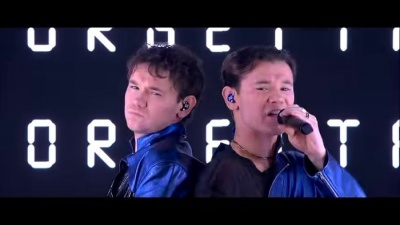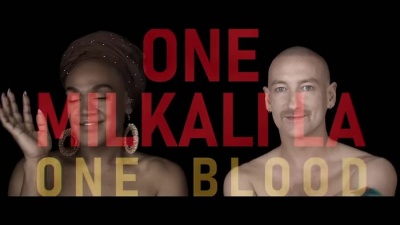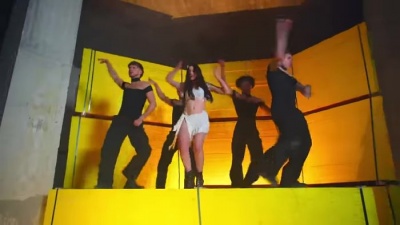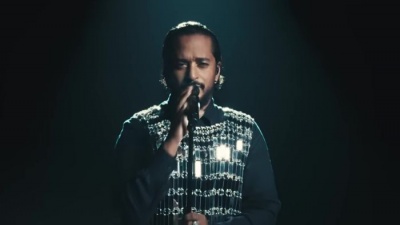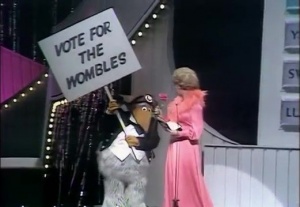Weaver's Week 2024-03-24
Last week | Weaver's Week Index | Next week
It's the annual Eurovision Song Contest preview column. Semi-finals are on 7 and 9 May, final on 11 May.
Six songs for Europe
As has become this column's tradition, we will preview six of the entries – those from the anglophone broadcasters, the host broadcaster, and whoever won Junior Eurovision last year.
We've watched and heard the official videos twice; first impression on Saturday last week, and coming back after a few days on Thursday. After ruminating on the songs a bit, and the best result we think is likely, we'll finish by ranking them on a three point scale: HIT, MISS, or MAYBE.
First listen
Our first pass was done in release order.
"Mon amour" – France Télévisions; lyric by Slimane; music by Slimane, Yaacov Salah, and Meïr Salah; performed by Slimane
Junior Eurovision was won by France Télévisions yet again, although we didn't know that when they released their Senior Eurovision song in mid-November. "Mon amour" is performed by Slimane, who grew up in the eastern part of Paris, and competed in various talent shows before winning The Voice: La Plus Belle Voix in 2016.
The song is a slow burner, it starts with a low verse before breaking into a falsetto chorus. "What about my pain, do you love me or not?" asks the lyric. The song builds to its climax, getting louder and more intense. Even if you don't speak a word of French, you get the meaning, the emotional power and impact is very clear.
Does the video provide clues to how they'll stage the song? Slimane's in a jacket with reflective silver bits, and he's standing behind a light sending out tiny beams of light; as he gets more excited, the little beads of light grow in number.
This is powerful, meaningful. It's a towering ice ballad, with a universal theme. There isn't an obvious gimmick in the song, no key changes or altered tempo, and if it gets stuck between two powerful bangers it just might get overlooked – that feels unlikely.
"Doomsday blue" – RTÉ; lyric by Bambie Thug, Cassyette; music by Bambie Thug, Cassyette, Sam Matlock, Tyler Ryder; performed by Bambie Thug
The Late Late Show is under new ownership this year. Ryan Tubridy has been exiled to a distant island because of money resting in his account. In his place is Cat Deeley's husband, Patrick Kielty. This new broom has brought some fresh ideas to the show, and allowed a very different entry to the Eurosong.
The video shows a witch casting a circle, apparently to get revenge on some useless old lover. There's a kawaii genki girl, a big dog, a tea party, and it's all very outré and outlandish. Certainly not the sort of thing we'd expect from conservative old RTÉ! There's a very fast beat to get the pulse racing, and the song is utterly relentless – it doesn't stop or let up.
How many songs are there from a non-binary fairy creature? How many industrial gothic numbers will this be up against? Not very many. "Doomsday blue" is going to stand out in a crowd, it's going to provoke a reaction – and for a first impression, the point is that the song stands out.
"Loop" – PBS; lyric by Kevin Lee, Joy Deb, Leire Gotxi Angel, Linnea Deb, Michael Joe Cini, Sarah Bonnici, Sebastian Pritchard-James; music by the above and John Emil Johansson, Matthew James Borg; performed by Sarah Bonnici
Another relatively conservative broadcaster, PBS have been sending pleasant if inoffensive ditties since the early 1990s. Often in the final, rarely within shot of the victory the island wants. "Loop" isn't going to provide it; pretty girl dances with lots of lads and sings over an insistent dance beat. Her vocal doesn't always beat the backing track.
They perhaps want to evoke the firey passion of "Fuego" a few years back; the song has a similar tone and feel to Dua Lipa – which is no bad thing. With a massive instrumental break about two minutes in, we're certain to get an eye-popping dance break like "Unicorn" last year. It feels like they're holding something back, which makes our job a bit harder.
"Dizzy" – BBC; music and lyric by Danny L Harle and Olly Alexander; performed by Olly Alexander
The bloke from Years and Years is the biggest and most contemporary name to represent the BBC in ages – possibly since Olivia Newton-John half a century ago. Eurovision is cool, Eurovision attracts the biggest names in town.
It's a fairly simple disco song, pulsing beat that never threatens to overpower Olly's tuneful tenor vocal. The song asks Olly's interlocutor to make him "dizzy from your kisses" and to "take me back to the beginning again". Video maintains this motif of circular motion, with Olly rolling as the camera spins, epicycles in epicycles. There's also some fan service as Olly removes his shirt.
Like with "Loop", there's a bit near the end where we might get a dance break or some other visual spectacle. The song finishes with a completed chorus, which feels like a bit of a missed opportunity – if they only put in a half-chorus, we might want to hear the song again.
"One milkali (one blood)" – SBS; lyric and music by Michael Ross and Zaachariaha Fielding; performed by Electric Fields
Electric Fields are Michael and Zaachariaha, a male-female duo. They were runners-up in SBS's 2019 selection show, and a fan fave since. The song incorporates some lines in Yankunytjatjara, an Aboriginal language of the Anangu peoples We don't have a performance video, just a lyric video with the two members on screen.
There's a recognisable disco beat, house or trance from the mid-90s. Overlaid is the message of the song, an unsubtle message that humanity is all humanity, emphasised by chanting in an unfamiliar language.
It's effective, makes its point and is going to offend nobody watching. This is background music for a love 'n' peace festival with a crowd gently swaying to vaguely ethnic beats. And that doesn't particularly scream "competitive song" to us. So much will depend on the staging, how the duo propose to tell the story – the lyric video tells us nothing on that.
"Unforgettable" – SVT; lyric and music by Jimmy "Joker" Thörnfeldt, Joy Deb, Linnea Deb, Marcus Gunnarsen, Martinus Gunnarsen; performed by Marcus & Martinus
Our hosts always leave it to the last minute to make their selection, and "Unforgettable" emerged as a near-unanimous choice from the Melodifestivalen process.
Marcus and Martinus are two young men with a similar tenor vocal register. The backing track is suspenseful deep house, designed to be a bit moody and gently threatening. The song takes almost a minute to reach its chorus, with lots of flickering white lights and a claustrophobic vibe – brings to mind The Matrix movie.
Four dancers join the duo at the chorus, then melt away as soon as the lads return to the verse. The song continues in the same vein for the second verse and chorus, then a building middle eight ... brings the song to an end. We expected a chorus, we didn't get any of it. Only way to hear the chorus, get some resolution, is to play it again in the winners' reprise.
We were surprised at how much we disliked this. It's Melodifestivalen by numbers: sterile and clinical production, a song simulating emotions without ever experiencing them, and staging designed to give almost anyone a headache. At some point, juries will see through SVT's threadbare clothes and there will be embarrassment.
The elephant in the Eurovision room
Since the start of October last year, there's been a screeching car alarm in the Eurovision fandom. It's gone from demanding that one broadcaster be thrown out, through spamming the other broadcasters' press offices, and now demanding that nobody watch this year's broadcast. This column doesn't believe a word of it.
This column always tries to bring the light, and does our best not to bring the heat. Another media group says "context changes everything"; for this column, context helps understanding. Here's an example. To an outsider it might be abhorrent for a light entertainment show to have pieces on "our troops in the war zone"; to the local audience, it's solidarity with their own sons and daughters and brothers and sisters.
The problems of the world are not going to be solved by this column pontificating from the safety of our keyboard. It's going to be solved by listening to everyone involved, and everyone needs to listen more than we talk. This column certainly needs to stop and listen; those who send young people out to kill and maim and bring misery also need to stop and listen.
This column believes in building a better world. Boycotts are inherently negative, and serve only to point out the faults. You don't like the world we're in? Go out and make a better one!
This column also believes in the power of the union, that humanity can achieve more when united than when we are divided. The EBU is – as its name suggests – a Union of European Broadcasters. The aim is plain: broadcasters achieve more by working together, more than they can achieve as individual operations. The EBU is much much much more than the Song Contest – it handles sports rights, distributes news clips, sends cultural programmes around the network. The EBU pushes technology, helps broadcasters share what they know to everyone's benefit. Song Contest is one week in May; the EBU operates all year round, and makes your television and your radio better every single day.
We might also remember how there was a widespread campaign to boycott the 2019 contest, when it was held in Tel Aviv. It is almost as if elements of Eurovision fandom want to disassociate themselves from anything to do with Israel. We wonder why this most curious state of affairs might be.
And we detect the deleterious hand of the Internet Research Agency or its successors. Last autumn, there was a load of agitprop from new entrants to the fandom, people and accounts with little history of the Song Contest in previous years. Accounts made similar points in suspiciously similar language. Was this an astroturf campaign, done to make it look like an opinion was more popular than it really was? To this column's opinion, the arguments felt like destabilisation from sockpuppet accounts, wholly unrepresentative of flesh-and-blood fans.
One final lesson to be drawn from history. Two years ago, viewers across Europe televoted for the song "Stefania" in their droves, in part to show solidarity with the people of Ukraine. It is much more difficult for people to televote against a particular song. Yet if the people of Europe genuinely wish to make a political point, the people of Europe will find a way to make their point. Equally, if the squeaky wheels shouting in fandom are completely wrong, the people of Europe will make their democratic choice.
Reader, the power is in your hands. Remember to vote wisely, and you're good to go.
Second listen and judgement
This round was done in approximate competitive performance order.
"Doomsday blue" – RTÉ; performed by Bambie Thug
Performing in the first half of the Tuesday semi-final: perhaps this is going to be song 9/18. On our second listen, we're picking up a very good dynamic range, the loud bits are properly loud and the quieter bits are properly quieter. If this is intentional, and if it makes it through the broadcast chain, we welcome it – too many music performances on tv are at a fixed volume throughout.
Is there something for the juries? Quite a bit of vocal range in the middle of the song, though we suspect the appeal will be more to artistic sensibilities than to technical excellence. The way they calculate scores from jury rankings mean that one juror taking a hatred to this song will not completely sink it, but two ranking it at the bottom will probably be terminal.
"Doomsday blue" is going to get a reaction. People are going to be talking about it before and during and after, and this song brings Eurovision to rarely-tapped audiences (waves at Kerrang Radio, your unlikely source for Eurovision hits since 2024). There will be enough televote to get to the final, and we can see there being enough points to get into the top 20. That third quadrant of the scoreboard would be RTÉ's second-best result in forever, and it is wonderful to see the staid broadcaster taking chances. HIT.
"One milkali (one blood)" – SBS; performed by Electric Fields
Second half of the Tuesday semi-final. Effectively, we've only got the audio to go on, we have literally no idea what it's going to look like on stage. We can imagine how we'd stage it, and hope that SBS can exceed our clichéd imagination.
Again, plenty for the juries to get their teeth into: a complex rhythm set, vocal lines soaring over the top, and the stagecraft to consider. Unlike the RTÉ entry, we cannot see too many jurors ranking this song low down their list, so there's going to be a smattering of jury marks as we get The Scores Where You Are.
Going through to the final? Very probably; it would take a colossal staging failure to prevent it. Expectation for the final? Impossible to tell until we see them on stage; if the television performance is slightly off, it'll really hurt the televote. Top quarter feels unlikely, bottom quarter would be a disappointment. But until we see the pair live, we cannot know, and so it's a MAYBE.
"Loop" – PBS; performed by Sarah Bonnici
This one pops up first half on the Thursday semi-final. Far too many of Thursday's songs are "bops", "dancey", and generally upbeat. Something is going to get lost in the shuffle, and we fear that a lot of the first half are simply going to be forgotten when the televote lines open.
The broadcaster's jury will only consider the song if it makes the final, but we don't think there's much to appreciate: restrained vocals, no particular technical fireworks. Stagecraft should be a positive, but we come back to the difficult question: what is this entry doing better than all others?
It would be a slight surprise to hear "Loop" in the Saturday final. Should it make the final, we fear it's going to be left in the bottom right quadrant. But then there's always a song that comes up and surprises us, and it's often in this uptempo women dancing genre. That is enough to merit a MAYBE.
"Unforgettable" – SVT; performed by Marcus & Martinus
So here's a thing. When we listen to the song, and don't watch the video, "Unforgettable" is an OK song. Not a brilliant song, not the second coming of Take That, more a Brother Beyond album track. But it is listenable, a toe-tapper, and not as bad as our first reaction. It is the staging with all its flashing lights that puts us off.
"Unforgettable" will be first on stage in the Saturday final. First chance for televoters across the continent to televote. How many are going to vote for this first song because they like it a bit, intending to vote for others as they go on but becoming too drunk to televote by song 15? There's always been a televote bump for the first good song, and these guys are in pole position to pick it up.
It's almost certain that juries will love this. We cannot explain the way juries adore SVT entries, or reward them with more points than they deserve. It's been going on since the current voting arrangements began in 2016, and we don't expect it to stop this year.
Are they booking hotel rooms in Gothenberg for next May? We hope not, this song doesn't deserve to win, and we're never going to give it more than grudging respect. But this column's "grudging respect" should transfer into a top half position, a good result by the standards of most recent hosts. But not of SVT, who expect a win almost every time. We've switched our mark a couple of times, ending up on MAYBE.
"Dizzy" – BBC; performed by Olly Alexander
We have, of course, been watching Saturday Night Takeaway, including the not!live performance Olly gave of this song. There was a rotating hemispherical house, a lot like "Breaking my heart" from last year (a song not remembered outside Denmark), a bit like "Snap" from two years ago (a song remembered across the planet). Houses are also a motif in the video, which is all in a domestic neighbourhood.
Anything for the juries? Olly is a very strong vocalist, the chorus gets more complex as it progresses, and he's going to have to have excellent breath control to hit the difficult notes at the end of the lines.
Do we expect to take the Week on the road to next year's Eurovision? No, "Dizzy" doesn't feel like a winner, not unless a couple of other performances fail. It does feel like a song that is going to pick up a very sizeable Big Wodge of televotes, and some decent slivers from the juries. Frankly, we'll be disappointed if Olly doesn't go top half, though he's more likely to win Ninth Place Napkin than a formal medal. Given the BBC's woeful underperformance in the past decades, top half would be a HIT.
"Mon amour" – France Télévisions; performed by Slimane
Doesn't need a complex staging, just lots of close-ups of Slimane emoting like his career depended on it, and shot in that gorgeous Gallic fashion with languid movement and focus pulls. Any jury worth its salt is going to love this song: massive vocal capacity, going from a gentle falsetto to a booming tenor and back again.
Is this going to connect with the viewer at home? Almost certainly: it would be a rare viewer who didn't appreciate that Slimane was being totally emotional in some way, even if they didn't know exactly how.
So, can France Télévisions win the Senior Eurovision Song Contest? It's possible, but... We remember how "Mercy" was a surefire top three song in 2018, only to stumble when it really mattered. "Voilà" in 2021 got beaten only by the biggest band of the year. "Mon amour" may have been out for so long that it'll be old hat by May. We reckon this song will be top quarter on sheer merit, and hope for more. HIT.
At the time of writing, the bookies' favourite is "Rim tim tagi dim", a punk song representing HRT. Behind comes "Teresa & Maria", a sentimental tune representing UA:PBC – looking for their second win in three years. "La noia" from RAI, "The code" from SRG SSR, and "Europapa" from NOS/NPO/AVROTROS are all given 10% chances of winning.
We'll come back to the Eurovision Song Contest in semi-finals week.
In other news
Great to see Giant, Sabre, and Dynamite from Gladiators on this week's Blue Peter. Can Giant lift presenter Shini lots of times? Of course. Will Dynamite go dancing with Henry the dog? Call up Strictly! Any danger of Sabre keeping a straight face in conversation with Hacker T Dog? You'll have to watch to find out!
Nominations for the BAFTA Television Awards are out. Game shows up for consideration are:
- Comedy Entertainment – Would I Lie to You?
- Entertainment – Strictly Come Dancing
- Entertainment Performance –
- Ant and Dec for I'm a Celebrity.. Get Me Out of Here!
- Hannah Waddingham for Eurovision Song Contest 2023
- Factual Entertainment –
- Celebrity Race Across the World
- Portrait Artist of the Year
- Live Event Coverage – Eurovision Song Contest 2023
- Reality – Squid Game: The Challenge
- Memorable Moment Award (voted by the public) – The Piano – 13-year old Lucy stuns commuters with jaw dropping piano performance
Nominations are also out for the BAFTA Television Craft Awards, for more technical, behind-the-scenes work.
- Director: Multi-Camera – Nikki Parsons, Ollie Bartlett, Richard Valentine for Eurovision Song Contest 2023
- Entertainment Craft Team
- Diccon Ramsay, Paddy Fletcher, Rikki Finlay, James Tinsley, Mathieu Weekes, Ben Norman for Squid Game: The Challenge
- Julio Himede, Tim Routledge, Kojo Samuel, Michael Sharp, Dan Shipton for Eurovision Song Contest 2023
Winners to be named on 12 May.
Nominations are also out for the New York Festivals of Television and Film. It's mostly a festival for serious documentaries but has a few lighter categories. Game shows up for the win are:
- Future Food Stars in Entertainment Program: Culinary Program
- The Traitors New Zealand in Craft Program: Host
We may well have missed some foreign-language shows, for which we apologise. We're also cheering for some great shows – The Future With Hannah Fry in Documentary: Science & Technology, CBC's Spark – Rage Against the Machine in the equivalent radio category, and Radio 4's The Skewer is up for three awards. Winners will be named on 16 April.
Quizzy Mondays
Helen Lippell took seat number five in the Mastermind final, perfect on prime ministers of the 18th century, and keeping her head in the general knowledge round. Well done to the other contenders. Ben Jones, the student, will have to reapply to become the youngest champion; Paul Judge did well with an excellent round on The Stranglers; and Peter Wilson could have talked for hours on animated movies.
Trinity Cambridge took the last spot in the University Challenge semi-final, beating Birkbeck by 165-100. Very much Birkbeck's game at the start, lots of correct buzzes but surprisingly few correct bonuses. When the starters fell for Trinity, they were able to convert the bonus marks much more effectively, work on the classical music bonuses was particularly effective. Being behind the game caused Birkbeck to buzz and hope, and that is always a risky strategy. It was great to see Trinity leave their seats to commiserate with Birkbeck during the closing credits, shows how much camaraderie there is between teams this year.
Great news for fans of mangled philosophy, Loaded in Paradise is back (ITV2, from Mon). E4 has the most rigged contest ever, and The Underdog Colon Josh Must Win (Mon-Wed). A new series of Taskmaster starts on C4 (Thu).
Bradley Walsh laughs at himself in The Chase The Bloopers (ITV, Sun), and Ireland's viewers can suffer Love Island Games (VM2, from Sun). The University Challenge Boat Races are on BBC1 next Saturday, followed by the Gladiators final.
We won't be publishing next week, so watch out for new Pointless from Easter Monday, new Masterchef Goes Large from Easter Monday, and the Mastermind final on Easter Monday. Have I Got News for You returns for another round of pro-establishment joshing (Friday 5 April), and watch out for ABBA Night on BBC2 (Saturday 6 April), marking 50 years since they shared a stage with The Wombles.
We'll be back on 7 April, we plan to look at the Mastermind final and Bring the Drama.
Picture credits: EBU and... RTÉ, BBC, SVT, SBS, PBS, France Télévisions.
To have Weaver's Week emailed to you on publication day, receive our exclusive TV roundup of the game shows in the week ahead, and chat to other ukgameshows.com readers, sign up to our Google Group.


